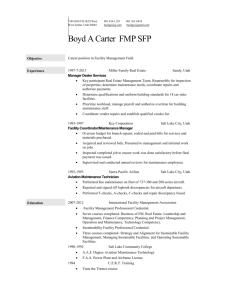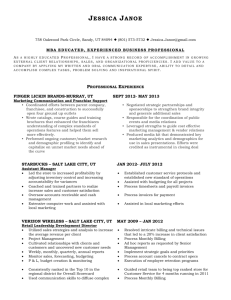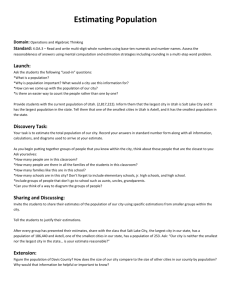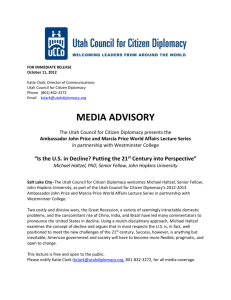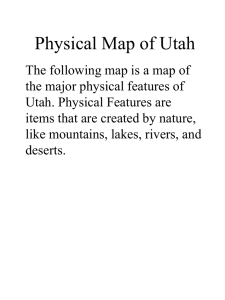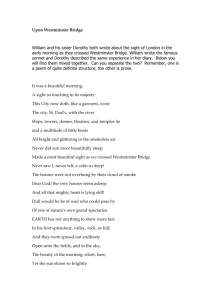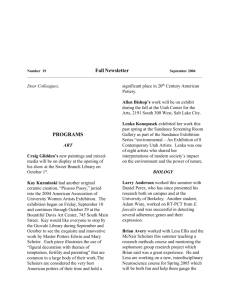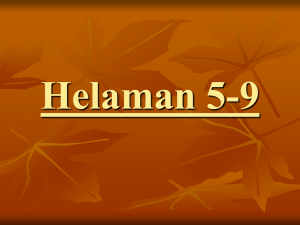Faculty Achievements - Westminster College
advertisement
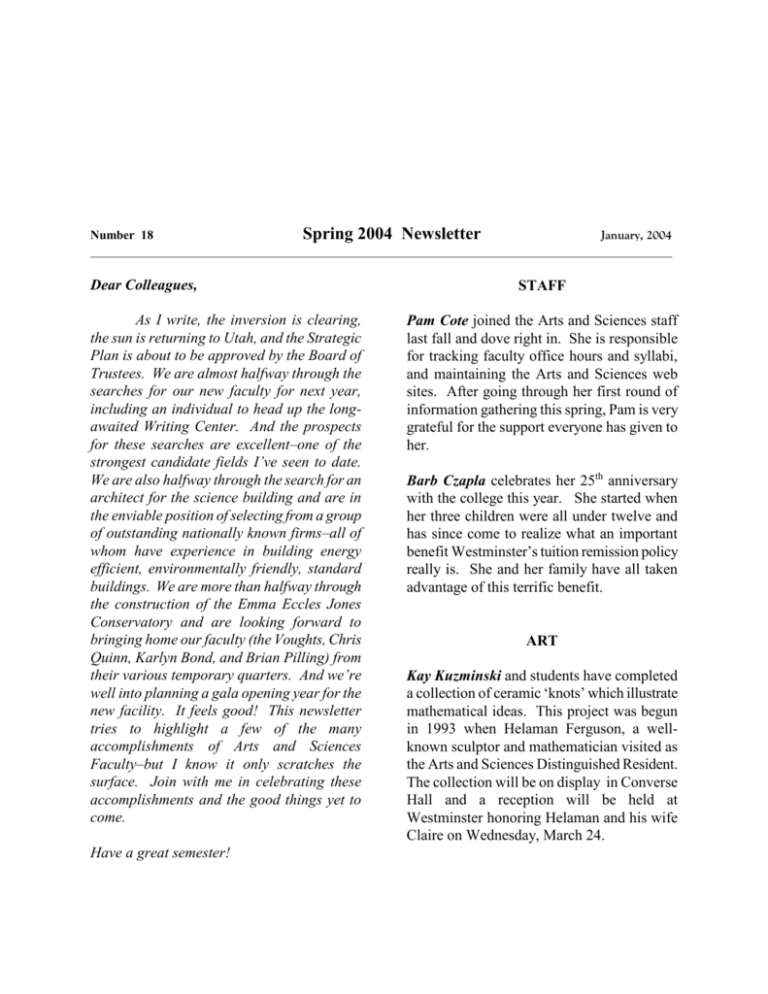
Number 18 Spring 2004 Newsletter January, 2004 ____________________________________________________________________________________________ Dear Colleagues, As I write, the inversion is clearing, the sun is returning to Utah, and the Strategic Plan is about to be approved by the Board of Trustees. We are almost halfway through the searches for our new faculty for next year, including an individual to head up the longawaited Writing Center. And the prospects for these searches are excellent–one of the strongest candidate fields I’ve seen to date. We are also halfway through the search for an architect for the science building and are in the enviable position of selecting from a group of outstanding nationally known firms–all of whom have experience in building energy efficient, environmentally friendly, standard buildings. We are more than halfway through the construction of the Emma Eccles Jones Conservatory and are looking forward to bringing home our faculty (the Voughts, Chris Quinn, Karlyn Bond, and Brian Pilling) from their various temporary quarters. And we’re well into planning a gala opening year for the new facility. It feels good! This newsletter tries to highlight a few of the many accomplishments of Arts and Sciences Faculty–but I know it only scratches the surface. Join with me in celebrating these accomplishments and the good things yet to come. Have a great semester! STAFF Pam Cote joined the Arts and Sciences staff last fall and dove right in. She is responsible for tracking faculty office hours and syllabi, and maintaining the Arts and Sciences web sites. After going through her first round of information gathering this spring, Pam is very grateful for the support everyone has given to her. Barb Czapla celebrates her 25th anniversary with the college this year. She started when her three children were all under twelve and has since come to realize what an important benefit Westminster’s tuition remission policy really is. She and her family have all taken advantage of this terrific benefit. ART Kay Kuzminski and students have completed a collection of ceramic ‘knots’ which illustrate mathematical ideas. This project was begun in 1993 when Helaman Ferguson, a wellknown sculptor and mathematician visited as the Arts and Sciences Distinguished Resident. The collection will be on display in Converse Hall and a reception will be held at Westminster honoring Helaman and his wife Claire on Wednesday, March 24. 2 BIOLOGY Larry Anderson has submitted a National Institute of Health Academic Research Enhancement Award grant entitled “A study of E. faecalis adherence and antisense plasmids.” Robyn Hyde is a collaborator, as is Nathan Shankar of the University of Oklahoma. The grant, if funded, would support students on frontline research on this important nosocomial pathogen. The grant is an extension of the American Association for the Advancement of Science and TriBeta Society award-winning research presented by his students last year. The competition for NIH money is fairly intense, but if funded, Larry believes this would be the first NIH grant for Westminster College. Larry and his student Ashley Phillips have also submitted an abstract to the National Council on Undergraduate Research meeting this year in Indiana. In short, Larry says “enterococci lives at Westminster!” Bonnie Baxter reports the TriBeta Research Foundation has awarded competitive research grants to the following Biology students for supporting supplies in their research projects: Stacy Vroman (Brian Avery) Ashley Phillips (Larry Anderson) Christopher Averill (Bonnie Baxter) Jason Rupp (Bonnie Baxter) Nicholas Hanson (Judy Rogers) Bonnie says the science faculty is very proud of the students’ contribution to their fine work here. Ty Harrison has been working with Steve Morgan’s office to develop a landscaping plan for the proposed parking structure/athletic field to be built on the west side of the campus. Presentations to the Sugarhouse Community Council and to Salt Lake City’s Planning and Zoning Board have been made. The 12-foot profile structure will approach the important Emigration Creek Natural Area used extensively by biology students, but will not damage it. In fact, the project will allow us to enhance the habitat along the creek by using low water-requiring, native tree and shrub species to enhance the habitat between the structure and the creek. Extensive planting of Gambell Oaks and other native shrubs and vines along the walls and new trail walkways are planned. One of the most important features of the new structure is that it has been designed to detain and store large amounts of rain and snow-melt water from the athletic field as well as from the existing Giovale Library and the new Health and Wellness Building. This is rainwater harvest technology and the water will be used to irrigate the native landscaping around the structure. Elliott Lips is a new biology adjunct this spring team-teaching the Natural World. He has a B.A. in Geology and Physics from Western State College, Gunnison, Colorado, an M.S. in Geology, Colorado State at Fort Collins, Colorado, and he’s ABD, Geography from the University of Utah. Elliott has over sever years teaching and ten years consulting experience. David Smith has been hired this spring to teach Human Physiology. He has a B.S. in Geology from the University of Arizona, Tucson, an M.S. in Biology from the University of Bridgeport, Connecticut, and a Ph.D. in Zoology (Paleontology) from Brigham Young University. David has been a biology instructor at Salt Lake Community 3 College for the past five years and is a certified divemaster and underwater photographer. the Salt Lake Valley. As a production artist and graphic artist/illustrator Justin donated drawings to the Utah Wilderness Alliance benefit exhibition and also to the national traveling MC Escher exhibition. COMMUNICATION/MPC Helen Hodgson, as part of her sabbatical, will be traveling to the Greenbrier Resort in West Virginia in March to participate in a Professional Food Writers Symposium. She will also be attending the annual conference of the International Association of Culinary Professionals in Baltimore in April. To ensure that she remains physically fit amidst the temptations of all this gourmet food, she is polishing her skiing technique in the “Women on Wednesdays” ski class at Deer Valey. Kim Zarkin will be making two presentations at this year’s Broadcast Education Association in Las Vegas, April 16-18, 2004. “Current First Amendment Issues” will be presented on a panel entitled “Annual Telecommunications Act Update,” which is her sixth year doing this panel. She will also be presenting the “Policy Implications of New Research on Media, Fear, Trust, and Mistrust” on a panel called “New Research on Media, Fear, Trust, and Mistrust.” She says she will also be finishing up her tour of duty as the Division Chair of the Law and Policy Division. Four new adjuncts were hired this spring in Communication: Jeanie Croasmun is teaching Professional and Technical Writing. She has a B.S. in Journalism and an M.A. in English from the University of North Texas, Denton. She has ten years experience as a professional writer and editor, and seven years college-level teaching experience. Brice Laris received his B.A. in Communication and Business and his M.P.C. degrees from Westminster College. He is teaching Communication Measurement and Evaluation in the MPC program. He works as a Senior Professional Development Training Specialist for Discover Card where he designs courses for the development of unit managers, supervisors, and trainers of the company. Debbie Mandoni Lewis is teaching Electronic Communication in Organizations in the undergraduate Communication program. She has a B.A. in Communication from Union University, Tennessee and an M.S. in Administration from the University of Notre Dame, Indiana. Debbie is currently the Vice President of Corporate Communication at Fairbanks Capital Corporation in Salt Lake City. COMPUTER SCIENCE Justin Anderson is teaching Electronic Design. He has a B.A. in Art, from Westminster College, a B.S. in Psychology from the University of Utah, and an M.P.C., with a marketing emphasis, from Westminster College. He is currently a marketing consultant and commercial property manger in Greg Gagne is beginning work on the seventh edition of Operating System Concepts–a textbook he co-authored with two colleagues. He is also working with the Utah Avalanche Forecast Center doing field observations including snow pack stability and analysis. 4 ENGLISH Georgi Donavin is working on hiring a director and making plans for the writing center that will open next fall. She is also completing an anthology of scholarly essays on the medieval sermon, continuing to cooperate with an international group working to place the poetry of John Gower online, and dreading the day this summer that her son gets his learner’s permit to drive. Peter Goldman had an article published in the latest issue of Contagion: Journal of Violence, Mimesis, and Culture entitled “Iconoclasm in the Old and New Testaments.” Susan Gunter is enjoying her sabbatical and “living” with Alice (Mrs. William) James, but reports that she gave a paper at the Modern Language Association in San Diego on December 28 titled “Henry James and Fletcherizing: The Pleasures of Consumption.” She also had an article published in Igitur, a journal in Rome, titled “Generic Heteroglossia: Henry James’s The American.” Fatima Mujcinovic’s paper, “The Mixquiahuala Letters: A Postmodern Feminist Literacy,” presented at the University of California–Santa Barbara in May 2002, has been selected for publication in the conference proceedings titled The Dynamics of Latino/a Cultural Literacy (coming out this year). Fatima has also helped several English majors with their applications to graduate school and has participated in the review of this year’s applicants to the McNair scholarship program. Natasha Sajé was awarded the Utah Humanities Council Colton Fellowship for her book project, Windows and Doors: A Poet’s Guide to Literary Theory. In conjunction with the fellowship she will be giving a talk about literary evaluation at the Utah Library Association Conference in May. Natasha will be speaking March 24-27 on a panel titled, “Poets reading novels; Novelists reading poems” at the 2004 Associated Writing Programs Conference in Chicago. David Stanley attended the American Folklore Society meeting in Albuquerque last fall, where he chaired a forum and presented a paper on the cooperative connections between academic and public-sector folklore. This winter, he’ll be giving presentations to the Wasatch Westerners in Salt Lake and to the Entrada Institute in Torrey, Utah, and later this month he’ll be the keynote speaker at the National Cowboy Poetry Gathering in Elko, Nevada. In May, he will be speaking on the image of the American West at a conference for English teachers in Brussels, and will also give a presentation on current environmental issues at the American Embassy. He and David Baddley are planning a May Term trip– seven European countries in fifteen days with the emphasis on writing and photography. In November, three of David’s students, Cory Cartwright, Blake Brown, and Jenny Poplar, presented papers at The Folklore Society of Utah meeting that they wrote in their class last spring. David reports fourteen other papers on topics ranging across the folklore spectrum were also presented and the day concluded with a tour of Hobbitville (Allen Park across from Westminster College). 5 HISTORY Susan Cottler is giving a paper at the Popular Culture/American Culture Association Conference in San Antonio, Texas in April titled “No Surrender, Line 3 Augmented: A Fenway Almanac.” Mike Markowski has been working hard learning to play the organ over the last couple of years and gave his first organ concert in November at the re-dedication ceremony of the First Presbyterian Church. He reports the hour-long concert “seemed to go well since no tomatoes actually hit me.” HONORS Richard Badenhausen attended the 2003 annual convention of the National Collegiate Honors Council in November with four Westminster Honors students in Chicago. He chaired a panel on “Recruitment and Retention in Honors” and in another session he delivered a talk on “What Makes Honors Distinctive?” His essay, “Mourning Through Memoir: Trauma, Testimony and Community in Vera Brittain’s Testament of Youth (completed last summer with the support of a Gore grant), has been accepted for publication by Twentieth Century Literature. MATHEMATICS Carolyn Connell attended the joint meetings of Mathematical Association of America and the American Mathematical Society in Phoenix in early January. She (and Dean Mary Jane) interviewed 20 candidates for the ongoing math search. She also attended various talks and visited with friends, including Helaman and Claire Ferguson. Many will remember Helaman from his Distinguished Residents’ visit in 1993. Helaman is well-known as a sculptor and mathematician. As chair of the regional section of the MAA, Carolyn is helping to plan the upcoming sectional meeting at Weber State University, March 25-26. Helaman and Claire Ferguson have been invited to give the after dinner talk on Friday evening (March 26). We hope to have all the Westminster math faculty and many of the math majors attending the meetings and giving talks. Richard Wellman is helping with the planning of the March meeting of the MAA and also taught two of Carolyn’s classes while she was in Phoenix. PHYSICS Peter Conwell and our undergraduate research group are working with Alex Goldfarb, M.D. and John Hurdle, M.D., Ph.D. at the Veterans Administration Hospital trying to predict how long a person will live after a kidney transplant. He said this information is very important to physicians and patients. If the prognosis is poor, dialysis may offer a better outcome. In addition, this choice frees up a scarce kidney for another patient that might have a better outcome. Traditionally, based on hundreds of parameters like age, gender, race, etc., physicians use simple linear regression to predict life expectancy post transplant. They are examining the use of Neural Networks and Support Vector Machines, which use non-linear techniques, to make better longevity predictions. They use the national kidney database consisting of 6 statistical data on more than ninety thousand kidney recipients to train their computer algorithms–a form of “data mining.” They ‘mine’ this huge database attempting to construct an appropriate statistical model governing how various individual parameters conspire to predict a surgical outcome. Typically, this training takes days of computer time running on a number of Pentium-based machines. POLITICAL SCIENCE Chuck Tripp published an op-ed piece entitled, “U.S. corruption in Azerbaijan” on November 13, 2003 in This Is What Matters, a British online political magazine; and a letterto-the-editor in the Ogden Standard Examiner on October 26, 2003, “Elections don’t make democracy,” about the October 15, 2003 elections in Azerbaijan and the wave of arrests that followed. PSYCHOLOGY Colleen Sandor is presenting a paper on February 6th titled “Split Mind: A Case Study of Multiple Personality Disorder” to the Salt Lake City Satellite of the International Institute of Object Relations Therapy. SOCIOLOGY Mark Rubinfeld published the Instructor’s Manual with Companion Website Teaching Tool for James M. Henslin’s Sociology: A Down-to-Earth Approach, Sixth Edition, (Allyn & Bacon, 2003), along with two book reviews for the October 2003 edition of Teaching Sociology. He also presented a paper, “Reading Schwarzenegger: The Subversive Appeal of Hollywood Action Films,” as well as chaired the “Disaster and Action Films: Cybernetics and Politics” panel at the Popular Culture Association/American Culture Association Annual Meeting in San Antonio, Texas in April. SPANISH Brenda Lake’s article, “Masculinidad afianzada por medio del quebrantamiento de leyes en Historia de la monja alférez escrita por ella misma was published in Tinta, a literary journal from the University of California in Santa Barbara last year. SPEECH/THEATRE Nina Vought’s expertise in yoga made her an ideal author to write the chapter, “How to Navigate a Roomful of Laser Beams” in a recently published non-academic, fun-to- read book, The Action Heroine’s Handbook.
